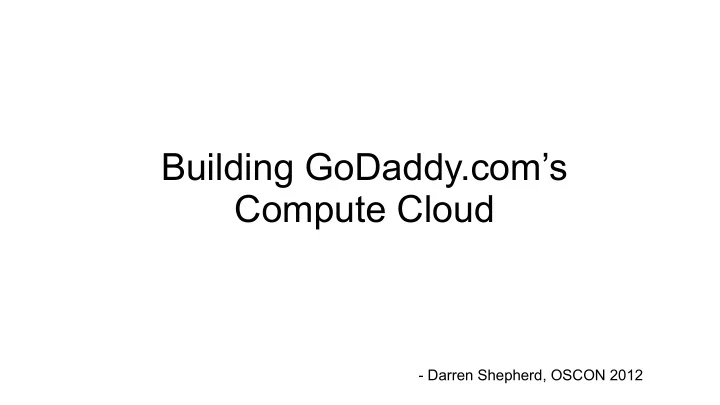

Building GoDaddy.com’s Compute Cloud - Darren Shepherd, OSCON 2012
About Me – Darren Shepherd ● Long time Linux user (since 1998?) ● Absolutely love Xen and Virtualization ● Happen to program Java ● Working for GoDaddy.com for about 2 years (since 2010) – Lead back-end developer for Cloud Servers ● Prefers writing code over writing slides
Overview ● GoDaddy.com ● Cloud Servers Product ● Software Architecture ● Messaging/Orchestration
GoDaddy.com ● Go Daddy is the world's largest domain name registrar and Web hosting provider – More than 53 million domain names under management ● More than 10.4 million customers ● DNS, SSL, Web Hosting, VPS, Dedicated, Cloud Servers ● Go Daddy has more than 40 product offerings
Go Daddy Cloud Servers - Product ● Focus on usability and simplicity ● Target SMB's, small development shops, etc.
Go Daddy Cloud Servers - Details ● Servers ● Networking – Up to 16GB of RAM – Private L2 – 40GB root disk – Assign multiple IP's to a network – Up to 1.2TB of additional – Load Balancing and Port storage can be added Forwarding – Ubuntu 12.04, Fedora 16, – Source IP filtering CentOS 5.8/6.2, Windows Server 2008R2 – VPN ● Storage – Snapshot/Restore – Volume from Snapshot
Control Panel
REST API ● “Curl Compatible” ● JSON/HTTPS ● HTTP Basic Auth ● Friendly URL's – /v1/virtualmachines – /v1/virtualmachines/42/volumes ● Hypermedia as the Engine of Application State (HATEOAS) ● Introspection capabilities through /v1/schemas ● HTML REST API UI ● URL encoded and multipart forms support
API - Raw Response
API – When browser is detected
What is this thing made of? ● Started development 2 years ago with Cloudstack ● Went live one year ago with a mostly Cloudstack cloud – UI and Storage changed ● Over the last year as we optimized and tailored Cloudstack we've taken a different architectural direction ● At this point most of Cloudstack has been replaced ● Future plans – either – Open source what we have – Converge with a another open source cloud stack
Software Stack ● PHP – UI ● Java – Backend – Spring, Hibernate, Jackson, and tons of Apache libraries ● Node.js – Network oriented services or agents
System Engineering ● Compute – Citrix XenServer – PVGRUB and HVM for Windows ● Networking – VLAN's – Custom VLAN bridging appliance ● Storage – VHD on NFS
Basics of a Cloud Compute Provisioning Platform ● Other technologies provide implementation of Compute, Storage, Networking ● A good platform should at least – Provide a good abstraction model – Reliably provision resources ● Recover when possible ● Fail gracefully when possible ● Or just fail otherwise
We had two approaches for service orchestration Synchronous JMS Based Workflow create_volume(); setup_network(); start_vm();
Our Apache ActiveMQ HA Setup
Our Event Driven Architecture ● No guarantee that events will be received – Events should be idempotent – Events should not be queued – Events should be resent until state is reconciled ● System is series of states that must be reconciled – Desired state should be recorded – Services update state or send events indication state should be updated ● Locks ensure no event single is processed concurrently ● Crash-only design
Redis & Zookeeper ● Redis provides basic PUB/SUB – Provides almost no features, which is great ● Zookeeper works as a distributed lock manager
Main loop ● API service records requested state to DB – Sends Redis event to process change ● Main Loop reads state from DB on interval or triggered from event ● Main Loop sends events to other systems
Real Architecture About 20-30 events are fired to start a VM
Done, let's have lunch... or Q&A
Recommend
More recommend